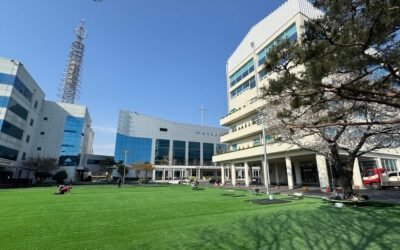The influential “Weekly Shincho” revealed the political reasons of what it called a “crude and childish” attempt to appease the Communist Party.
by Massimo Introvigne

The “Weekly Shincho” is generally regarded as one of the most influential magazines in Japan. It has a conservative orientation. It is very significant that, within the context of Prime Minister Kishida’s announcement that he will step down from his position, the magazine published a report by award-winning investigative journalist Masaaki Kubota on the obnoxious activities of Kishida’s Ministry of Foreign Affairs in Senegal.
“Bitter Winter” was the first international media outlet that blew the whistle on the attack by the Japanese authorities against a school in Senegal that greatly benefited local women. The school was sponsored by the Women’s Federation for World Peace (WFWP), an NGO that has enjoyed for more than twenty-five years general consultative status at the United Nations’ Economic and Social Council (ECOSOC). The “general consultative status,” which the WFWP received in 1997, is different from the “special consultative status” granted to thousands of NGOs. General consultative status is comparatively rare. It is granted after a thorough investigation, according to the ECOSOC rules, to “fairly large, established international NGOs with a broad geographical reach,” which have offered “substantive and sustained contributions” to the aims of the United Nations in “several fields.”
There is no doubt that the WFWP has been founded in 1992 by the leaders of the Family Federation for World Peace and Unification, previously called the Unification Church, Dr. Hak Ja Han Moon and her late husband Reverend Sun Myung Moon. This is by no means concealed and is clearly explained on the web site of the organization. On the other hand, the aim of the WFWP is not to proselytize for the Family Federation but to empower women internationally through charitable and educational work. Those who participate in the activities of the WFWP belong to all religions and to none.
As reported by Kubota, “In April 2023, a section chief from the Ministry of Foreign Affairs’ International Cooperation Bureau landed at Blaise Diagne International Airport in Senegal, Africa. After a long journey of about 33 hours from Japan, the section chief headed for JAMOO2, a vocational training school for women in the city of Thibaouin Poule in the Rufisque prefecture of Dakar Province in the country.” As the article explains, JAMOO means “bring peace” in the local Wolof language, and the number 2 indicates it was the second school of the project. At JAMOO2, the “Shincho” explains, some one hundred women are learning skills such as dressmaking, embroidery, lacemaking, and beading.

According to Kubota, the school “was built about six years ago with Japan’s ODA (Official Development Assistance) as part of the Grant Assistance for Grassroots Human Security Projects. The website of the Embassy of Japan in Senegal also contains information about the handover ceremony held on July 25, 2018, as well as information that the Japanese government provided 74,639 euros (9,553,792 yen) to a local NGO.”
But why the Japanese Ministry of Foreign Affairs sent a delegation to Senegal? Kubota asks. Was it to make sure that the school was providing good services? Not at all: the delegation went there to “erase” the traces of the school’s connection with the WFWP.
As the “Shincho” notices, “In the photo of the handover ceremony mentioned earlier, a banner is hung next to the entrance of the school building, and when you enlarge it, you can see the logo of a person standing on a globe-like figure next to the school’s name ‘JAMOO.’ This logo is hung on the exterior walls and signs of the school building and is also printed on the chest of the uniforms provided to students and on their graduation certificates. The Ministry of Foreign Affairs’ section chief ordered the school to erase all the logos, which could be said to be the symbol of ‘JAMOO2.’ They also demanded that the phone number, email address, and even the registration information submitted to the Senegalese government be changed, as if to transform ‘JAMOO2’ into a completely different school. They also demanded that one of the teachers who had been teaching the students there for many years be ‘expelled.’”

As Kubota noted, this was an abuse of authority. The Japanese ODA had offered a contribution but by no means had this covered all the costs of the school nor even the majority of them. The rest came from private donors, mostly connected with the Japanese WFWP. Véronique Diop, the school’s principal and head of the NGO that applied for the ODA, told Kubota that “the Japanese government officials took an overbearing attitude and demanded that we erase all traces of [WFWP connection with] the school to appease the Japanese opposition parties and public opinion. Terrified that we might lose the school, I had no choice but to comply.”
To explain what Kubota calls a “desperate cover-up attempt” by the Japanese Ministry of Foreign Affairs, the article refers to an “incident dating back to a House of Representatives Foreign Affairs Committee meeting in November 2022. At that meeting, Keiji Kokuta, a member of the House of Representatives from the Japanese Communist Party, asked whether JAMOO2, a facility run by the Japan WFWP, was being used by the former Unification Church for missionary activities.” Although the answer to this question was “no,” the Communist Party clearly tried to embarrass the government by implying that it continued to cooperate with the Family Federation/Unification Church.
Both the then Foreign Minister Yoshimasa Hayashi and Kishida himself answered the Communist leader by promising to investigate. On March 17, 2023, Kokuta insisted with his questions at another meeting at the House of Representatives Foreign Affairs Committee. Then Minister Hayashi, Kubota reports, “responded with the results of the investigation: local Embassy staff visited JAMOO2, checked all the documents, and declared that the school was an ‘independent NGO’ and had no affiliation with the WFWP.”

Kubota notes that technically “the results of this investigation were not a lie. However, they were a deception. This is because the person who proposed the scheme of applying for ODA as an ‘independent NGO’ was a staff member of the Japanese Embassy in Senegal.” In fact, the whole JAMOO project was launched and funded by WFWP in 1995. Kubota reports that it was highly successful and praised by both the Senegalese government and the United Nations. In fact, it was so successful that it needed a new building.
“At that time,” Kubota writes, “a staff member of the Japanese Embassy in Senegal, whom she had known for some time, suggested to Diop that she may use Japan’s ODA to build a new school building. It was a social contribution that was valued by the United Nations and the Senegalese government, and the Japanese Ministry of Foreign Affairs would also be happy with it. Thinking that this was a godsend, Diop immediately tried to apply but was given the following advice by an Embassy official: rather than applying through the WFWP, it would be better for Diop to set up a civil society organization herself and apply through that organization.”
Kubota does not believe that the suggestion came because of the WFWP’s connection with the Unification Church. The conversation between the Japanese Embassy staff and Diop happened in 2015, well before the 2022 assassination of former Prime Minister Shinzo Abe. At that time, “the former Unification Church was hardly criticized at all in Japan, and [ruling] Liberal Democratic Party lawmakers were also attending events held by related organizations as a matter of course.”
In fact, Diop told Kubota that, “According to the Embassy staff, it seems that Japanese ODA tends to be more easily provided to local civil society groups than to international organizations like the WFWP. They simply acknowledged our long history of supporting women in Senegal and were simply supporting us.” For this reason, Diop established a local NGO that applied for the ODA. But in no way did she hide the connection with the WFWP, in fact she was “proud” of it.
Kubota notes that there are two “undeniable facts”: first, that the ODA was not given to the WFWP but to a Senegalese NGO, and second, that the relationship between that NGO and the WFWP, whose branch in Japan continued to contribute crucial donations for the JAMOO project, was not hidden. All this was easy to discover without complex research.

So, again, why Japan’s Foreign Ministry took the trouble to send people to Senegal to erase all the visible traces of the WFWP’s connection with JAMOO? “The key to solving this mystery,” Kubota answers, “lies in the House of Representatives Foreign Affairs Committee meeting on March 29, 2023. Unsatisfied with the government’s response of March 17, 2023, [Communist] Representative Kokuta argued that the reason the Ministry of Foreign Affairs was trying to evade the issue by conducting a ‘sloppy investigation’ was because the ODA had been approved by Prime Minister Kishida when he was Foreign Minister. He suggested that the investigation had been distorted out of consideration for the government, who wanted to ‘keep quiet about anything related to Kishida.’”
The next day, March 30, 2023, the Communist Party’s newspaper, “Akahata,” also reported that “then Foreign Minister Kishida was involved in providing ODA to organizations related to the Unification Church.”
So, Kubota reports, the Ministry of Foreign Affairs, intimidated by the Japanese Communist Party, put out a “crude and childish attempt” to protect Kishida. “Diop, who was suddenly ordered by the section chief of the Ministry of Foreign Affairs from Japan to ‘destroy the evidence,’ was so shocked and scared that she might lose her school that she became ill for a while. Is pushing an innocent Senegalese person to this extent really what Japan’s international aid should be?”
“Prime Minister Kishida is stepping down,” the “Shincho” concludes, “but the investigation into what this administration has been up to behind the scenes has only just begun.”

Massimo Introvigne (born June 14, 1955 in Rome) is an Italian sociologist of religions. He is the founder and managing director of the Center for Studies on New Religions (CESNUR), an international network of scholars who study new religious movements. Introvigne is the author of some 70 books and more than 100 articles in the field of sociology of religion. He was the main author of the Enciclopedia delle religioni in Italia (Encyclopedia of Religions in Italy). He is a member of the editorial board for the Interdisciplinary Journal of Research on Religion and of the executive board of University of California Press’ Nova Religio. From January 5 to December 31, 2011, he has served as the “Representative on combating racism, xenophobia and discrimination, with a special focus on discrimination against Christians and members of other religions” of the Organization for Security and Co-operation in Europe (OSCE). From 2012 to 2015 he served as chairperson of the Observatory of Religious Liberty, instituted by the Italian Ministry of Foreign Affairs in order to monitor problems of religious liberty on a worldwide scale.



